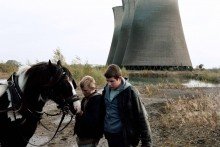Using Oscar Wilde’s children’s story The Selfish Giant as the starting point for this bleak but beautiful social-realist tale might seem unlikely but it’s an inspired idea.
Writer-director Clio Barnard got the first inklings for the film when she met young scrappers (kids who scour the streets for scrap metal to sell) while making her last film, The Arbor, on a Bradford housing estate. Combining that initial spark with a sprinkle of Wilde’s magical fable makes for a film that’s both hard-hitting and poetic, tough and tender at the same time.
The film is anchored around two lads Arbor (Conner Chapman) and Swifty (Shaun Thomas) from impoverished backgrounds who don’t fit in at school and are more at home on the streets than in the classroom.
Arbor is quick-thinking, streetwise, foul-mouthed and entrepreneurial while his pudgy pal Swifty is quieter, softer, less assertive but fiercely loyal to Arbor.
Excluded from school after a fight, the two take to scrapping to earn extra money for their families but also because there’s nothing else for them to do. They fall in with scrapyard owner Kitten (Sean Gilder) who certainly doesn’t live up to his name. He’s the modern equivalent of Wilde’s giant, a brute living on the fringes of the law, happy to taking scrap from locals and not ask too many questions. Invariably, gathering the scrap can involve danger and breaking the law.
Kitten grudgingly accepts the boys and lets them hire out his pony and trap to collect scrap; mainly because Swifty has a natural way with horses and the scrapyard supremo is involved in illegal ‘sulky racing’ (racing with ponies and traps) and the gambling scene around it.
It may be set amid the post industrial wastelands, rundown estates and harsh realities of modern Britain but Barnard infuses her film with a lyricism that lifts it out of the gloom. Lingering shots of horses in fields, towering pylons and huge cooling towers give a sense of something beyond the everyday grind – but you always sense that for Arbor and Swifty there can be no escape from the drudgery of their lives.
The film works so well because of the brilliant, remarkably natural performances of Chapman and Thomas as Arbor and Swifty, who are both utterly convincing despite never having acted before. We care about them and root for them, but this is a sentiment-free depiction of them and their environment. The Selfish Giant has anything but a romantic view of childhood and while it may be based on a children’s story there is no fairy tale ending.
It’s a heartbreaking film, not just because of the situation these two young lads find themselves in but in the wider sense of the desperation of their community in the post-industrial, post-Thatcher world. There are cinematic echoes of Kes and Fishtank here, but The Selfish Giant stands up by itself as a reminder of how harsh life in modern Britain can be.







